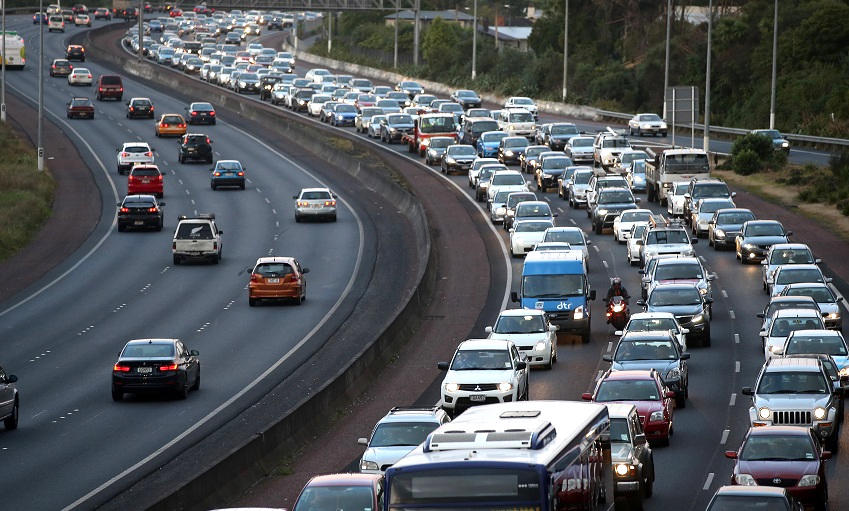National unveils huge transport plan

The National Party wants more private investment and various forms of cost recovery to fund ambitious transport schemes as part of its election policy.
The party accuses Labour of talking big but doing little about transport, in part because of its opposition to utilising private funding sources.
But the National leader Christopher Luxon says there are US$11 trillion in sovereign wealth funds and US$50 trillion in private pension funds which go into investments.
"A lot of those funds want to invest in long-term infrastructure with long-term returns," Luxon says.
"A lot of these people have spoken to us, but New Zealand has one of the most restrictive regimes on Foreign Direct Investment in the OECD."
The scale of National's plans[1] is vast. They include a four-lane highway from Whangarei to Tauranga. Four stages of this project would be done within 10 years, leaving just two more to be completed later. This later section would include a road over the Kaimai ranges.
'World's most expensive road' back on the drawing board
Almost as dramatic is a plan to revive Auckland's East-West Link, once dubbed the world's most expensive road[2]. Controversy raged for years over this now dormant proposal to build a four-lane highway connecting State Highway 20 at Onehunga and State Highway 1.
It was forecast to cost $1.25 billion to $1.85 billion by Waka Kotahi, and is now predicted to cost $1.9 billion according to National's analysis.
Another dramatic idea is to build a second tunnel under Mt Victoria in Wellington. National thinks this will cost $2.2 billion.
In arguing for these and other schemes, the party says Labour has been ineffective during six years in office.
"In contrast, National will accelerate investment in modern, world-class transport infrastructure," a supporting document issued by the party says.
"We will use a range of funding sources, including additional government investment, value capture [tax] and cost recovery tools, toll roads where appropriate, and equity financing from entities like the Super Fund, KiwiSaver funds, or global investors."
"This approach will reduce the burden on taxpayers while leveraging the expertise of experienced global infrastructure investors."
Besides toll roads, the funding details under National's plan would include targeted rates on housing built in newly served areas and congestion pricing for cars entering crowded city streets.
The whole range of projects would cost $24 billion.
Auckland & Wellington proposals
Going into more detail, the party wants to ease congestion in Auckland's eastern suburbs by completing the 21 kilometre Mill Road highway between Manukau and Drury.
Public transport in Auckland would also be enhanced, and the party would replace Labour's light rail scheme with a North West Rapid Transit scheme, an airport to Botany busway and an Eastern busway.
The party also favours an additional harbour crossing[3] for Auckland’s Waitematā Harbour, which is the subject of a current investigation by Waka Kotahi.
National says it supports the current timeframe and says it is committed to delivering a second crossing that at a minimum provides for additional road connections.
It says it will seek to reduce the upfront cost of this project to taxpayers by seeking options for private funding.
Besides a second Mt Victoria Tunnel, the Wellington region would get an extra highway across the Hutt Valley to relieve congestion on the Petone foreshore.
Another new road would link Petone and Granada, opening up inaccessible land for 5,000 houses.
Other projects include the Hope Bypass in Tasman, the Woodend Bypass north of Christchurch and the Southern Links project in Hamilton.
The party has also pledged to discontinue the Let’s Get Wellington Moving (LGWM) governance and funding structure. LGWM is a joint venture between Waka Kotahi, Wellington City Council and Wellington Regional Council.
This controversial organisation is due to start work on largely pedestrianising a big chunk of central Wellington. This is the so-called 'Golden Mile' scheme. It is not clear what impact the National Party pledge will have on that $139.4 million plan.
However a group of LGWM sceptics on Wellington Council say the project should be delayed.
"LGWM’s projects should be paused until after the election, in particular the contentious Golden Mile project," says one of them, Councillor Nicola Young.
Under National's plans, roads would also be improved in Queenstown, Otago and elsewhere.
'Costings way out of kilter'
Meanwhile the Labour transport spokesperson David Parker says National's costings are way out of kilter.
Parker says the shortfall in In National's costings for just four projects is at least $2.8 billion.
“Many of National’s estimates appear to be based on old data and fail to take account of real-world escalations in road construction costs," Parker says.
"Between March 2021 and September 2022, roading material costs rose as much as 45%, labour costs went up 7.5%, diesel was up 90% at peak, steel up 57% and bitumen prices rose by 104%.”
References
- ^ National's plans (www.interest.co.nz)
- ^ the world's most expensive road (www.newshub.co.nz)
- ^ an additional harbour crossing (www.interest.co.nz)